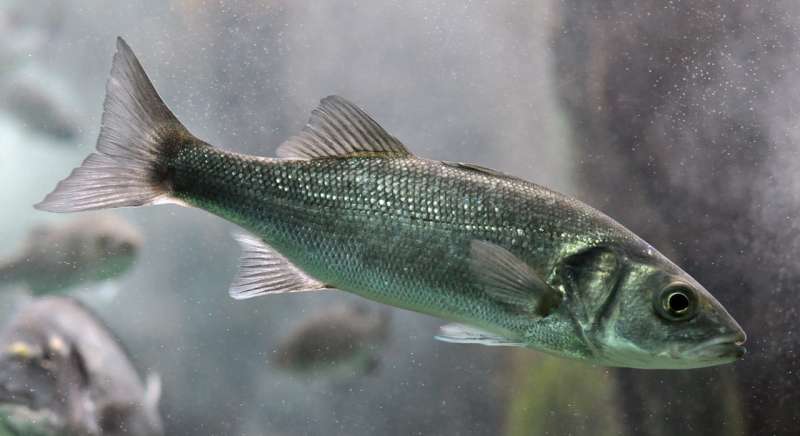European sea bass show chronic impairment after exposure to crude oil

We may be underestimating the long-term impact of oil spills on fish, particularly their ability to tolerate low oxygen environments, according to research from the University of British Columbia (UBC), the Université de Bretagne Occidentale (UBO) and L'Institut Français de Recherche pour l'Exploitation de la Mer (Ifremer).
The new study tested the capacity of European sea bass to perform not just in typical seawater but also in low-oxygen level sea water. Researchers used a novel integrated respiratory assessment paradigm (IRAP) to screen both the fish's aerobic capacity and tolerance for low-oxygen (hypoxic) levels, grouping the fish into hypoxia tolerant and hypoxia sensitive phenotypic groups. They then exposed the fish to dispersed crude oil for 48 hours.
The fish's performance was retested nearly six months later—much longer than most previous studies – to see if the exposure to oil had residual effects.
"After oil exposure, sea bass that were previously strong hypoxic performers lost their edge," said Yangfan Zhang, a UBC zoologist in the Faculty of Land and Food Systems and lead author on the study.
"Had we not distinguished the hypoxia tolerant and hypoxia sensitive phenotypes we would have missed an important effect. Obviously, this is concerning, not only in terms of the survival of certain individuals, but in terms of the impact that exposures might have on weakening the species' gene pool."
Surprisingly, the researchers, who published the findings in Aquatic Toxicology, didn't find any long-term residual impacts on fish that were weaker hypoxic performers. Exposure to oil also had no long-term residual impact on the fish's aerobic performance.
"Ecologically, sea bass that can tolerate low oxygen represent an important component of the gene pool for this species to survive the periodic bouts of hypoxia in their habitat, which are increasing in frequency in a global sense," said study co-author Tony Farrell, with UBC's Faculty of Land and Food Systems and the Department of Zoology.
"So even subtle residual effects on this group of high performing fish could be of great concern for population dynamics, recruitment and production."
"Besides bringing new knowledge about the impact of oil exposure on a marine organism, this project highlights a fruitful collaboration between scientists and the oil industry, for the benefit of all," said project leader Guy Claireaux, professor at the University of Brest, France.
More information: Yangfan Zhang et al. Exposure of European sea bass ( Dicentrarchus labrax ) to chemically dispersed oil has a chronic residual effect on hypoxia tolerance but not aerobic scope, Aquatic Toxicology (2017). DOI: 10.1016/j.aquatox.2017.07.020
Provided by University of British Columbia


















